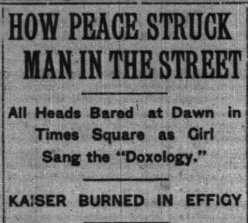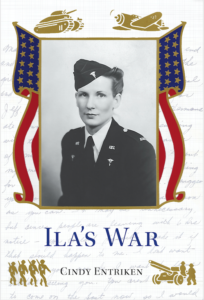The New York Times, Tuesday, November 12, 1918.
https://www.newspapers.com/image/20557596/?terms=Kaiser%20burned%20in%20effigy&match=1 (accessed 11/10/2021)
Armistice Day: World War I ends
At the 11th hour on the 11th day of the 11th month of 1918, the Great War ends. At 5 a.m. that morning, Germany, bereft of manpower and supplies and faced with imminent invasion, signed an armistice agreement with the Allies in a railroad car outside Compiégne, France. The First World War left nine million soldiers dead and 21 million wounded, with Germany, Russia, Austria-Hungary, France and Great Britain each losing nearly a million or more lives. In addition, at least five million civilians died from disease, starvation, or exposure.1
———-
My grandmother, Wava (Armsbury) Farrington was 10 years old the day she, like people all over the world, learned that the war was finally over.
Grammy didn’t talk with me about her recollections of the end of the war. I’m not sure she ever told anyone, and I certainly wouldn’t have learned her story if she hadn’t written a college essay for an English Composition class she took at Kansas Wesleyan College when she was in her late 60s.
Following Grammy’s death in 2004, I received a large box of papers and among them I found her essay. I’m proud to share this true story with you and hope you enjoy it as much as I do.
The night they burned the kaiser
by
Wava Farrington
I was allowed to stay up all night when we burned the Kaiser in the town square, because the war was over. The telegraph wires hummed, the bells rang, the armistice has been signed, and the whole town celebrated until early morning.
About noon on November 11, 1918, the news came over the telegraph in our little town of some 600 people, [Lucas, Kansas] that the war was over. The depot agent’s green eye shade pushed up on his forehead, ran into the street waving a yellow piece of paper and shouting, “The war is over! The war is over!”
I was 10 years old and my best friend was 12, and we stood holding hands and jumping up and down and screaming, “The war is over! The war is over!”
I think back and wonder if we really realized what had taken place. We rushed up town to the one main street, and watched the adults as this was one of our favorite past times anyway. But now it was a great deal more interesting. Everywhere was excitement, men standing on the sidewalks, women gathered by twos and threes, all trying to talk at once, and as we listened we heard plans for a real celebration to take place that night.
What a celebration! Everyone was on main street. All the farmers and their families from the area came to town. The two mercantile stores and the drug store stayed open and we had some nickels and some pennies to spend. Five whips of licorice for a penny, several pieces of candy for a penny and a large ice cream cone for a nickel. We were rich!
Some of the town musicians had quickly put together a band and we stood spellbound as they played the songs that the war had made popular. “Over There”, “Tipperary”, as well as the sentimental ones, “Until We Meet Again” and “A Long Long Trail A Winding.”
It wasn’t long until the two boys who were always our pardners (sic) at the games we played in the neighborhood – like Buffalo Girls and The Miller – joined us. Of course they didn’t walk with us, but they were right behind us and soon they were sharing their candy with us.
We became solemn and sad as we heard the grown ups talking about the boys that would not be coming home, and we were happy for our Sunday School teacher because her sweetheart would be coming home and they would be married soon.
We walked back and forth past the center square where an effigy of Kaiser Wilhelm of Germany hung from a rope and pulley. We could see that this was a man’s suit stuffed with straw, a replica of a German helmet on the head, and a wooden sword hanging at his side. Underneath was piled material for a huge bonfire.2
Even now I wonder if we got tired of walking, looking, and listening, but I can’t remember that we did. I do remember sitting on the steps of the stores; that some of the children were put to bed in the wagons that lined the street, and we wondered why some of the men had to be helped into some of the wagons to sleep. Because those things were not talked [about] in our homes, we didn’t know until we were older that they had to sleep off the effects of home brew.
We watched some of the high school kids slip into the dark alleys and we giggled. We really didn’t know why they went so stealthily, but we knew that it was something about which we should giggle.
Suddenly light flared up in the square as the fire was lit, the straw that formed the Kaiser began to smoke, then burst into flame. The fire rose higher and higher and was by far the biggest bonfire that we had ever seen. Flames and smoke blotted out the starry sky, and we watched in absolute fascination as Kaiser Wilhelm vanished in a shower of ashes.
Oh! it was a night never to be forgotten, and I will always remember the night we burned the Kaiser and I was allowed to stay up all night!
———-
Sources:
1https://www.history.com/this-day-in-history/world-war-i-ends (accessed 11/8/2021)
2To see a photo of preparation for him to be burned in effigy in Guilford, Maine, go to https://www.mainememory.net/artifact/33808 (accessed 11/10/2021)



Dear Cindy, thanks for a wonderful story. I don’t remember whether similar actions took place over here. What our Grandparents told us, there was widespread hatred for whatever was German-related! The “Hun” or the “Boche” had been a cruel enemy and occupant. Indeed the Germans had behaved very badly, and this filled many people with revulsion and fear, which partly explains why so many inhabitants left the country en masse, when the Germans invaded Belgium for the second time in May 1940. This feeling was to stay for a long time, even after WWII. One such occasion can be illustrated by a family trip my Dad organized in 1948 (or was it 1949 ? We would go visit Denmark in the summer, and Dad had organized a complete trip by car. Grandma who lived with us (wwii widow) didn’t know until some days before the trip, but when she learned that we would be driving thru a part of Germany and planned a short stay in the country, she was so upset and refused to accompany the family! After a series of strong arguments and endless discussions – Daddy canceled the whole trip – instead we visited the Belgian coast … Grandma (mother’s side) really loathed anything German until she passed away in 1963…
WOW, Alain. What a story. I do know, and have seen photos on line of bonfires in Paris burning the Kaiser in effigy. I imagine if one took the time to search Newspapers.com, one could find a lot of stories about public events that happened after the announcement that the war had ended. One of the things that occurred to me as I was writing the blog was that America was in the war for only one year while Belgium, France, England, Japan, Russia, and others were in the fight so much longer and had such enormous losses. I was surprised that I didn’t see more articles about celebrations in those countries. Perhaps the residents were so tired, had lost so much, there was little energy for celebration. And, of course, the fighting continued for months afterwards, so the losses continued to mount for everyone. Thanks for sharing your story with me. PS – I know I owe you an extensive email in reply to yours, and I promise it’s coming!
Awesome! Great story, Cindy!
Thank you so much, Liz. I’m so glad to be able to share some of my grandmother’s writing with others because she had a unique perspective, one based on an era unfamiliar to us now. And Grammy was a wonderful storyteller. I know that at one time in her life, when she was in her late 30s she aspired to be a writer and even worked for a time at the Lincoln (Kansas) Sentinel Republican newspaper. I think that going to college in her late 60s, and taking required classes in English Composition finally gave her the outlet she needed to write down some of her life experiences so that now I have a small collection of stories from her life. I’m thrilled that I have an outlet to share her stories with others so that Grammy finally gets recognition for her writing and her storytelling.
Hi Cindy,
Thank you so much for this story. WWI is often referred to as the “forgotten war.” I know that during my school years, WWI might have been mentioned in history class, but glossed over. No details to speak of. So your grandmother’s memories of that wondrous night are very precious. And she obviosly WAS a writer. You inherited that talent. I want to hear more.
Thanks, Pat, for your very complimentary comments. I have some other stories Grammy wrote about her teen-age years – not war stories but life in rural Kansas in the late 1910s. I hope to publish them in the Lincoln, Kansas, newspaper at appropriate times. Grammy would be pleased.
I’ve been collecting war memorabilia now for several years. My collection is very small compared to many others but I do plan to publish more about WWI. I’m always looking for little-known bits of history I can share with others. I know only too well how easy it is to forget history if it isn’t written down!
Take care and thanks for writing.